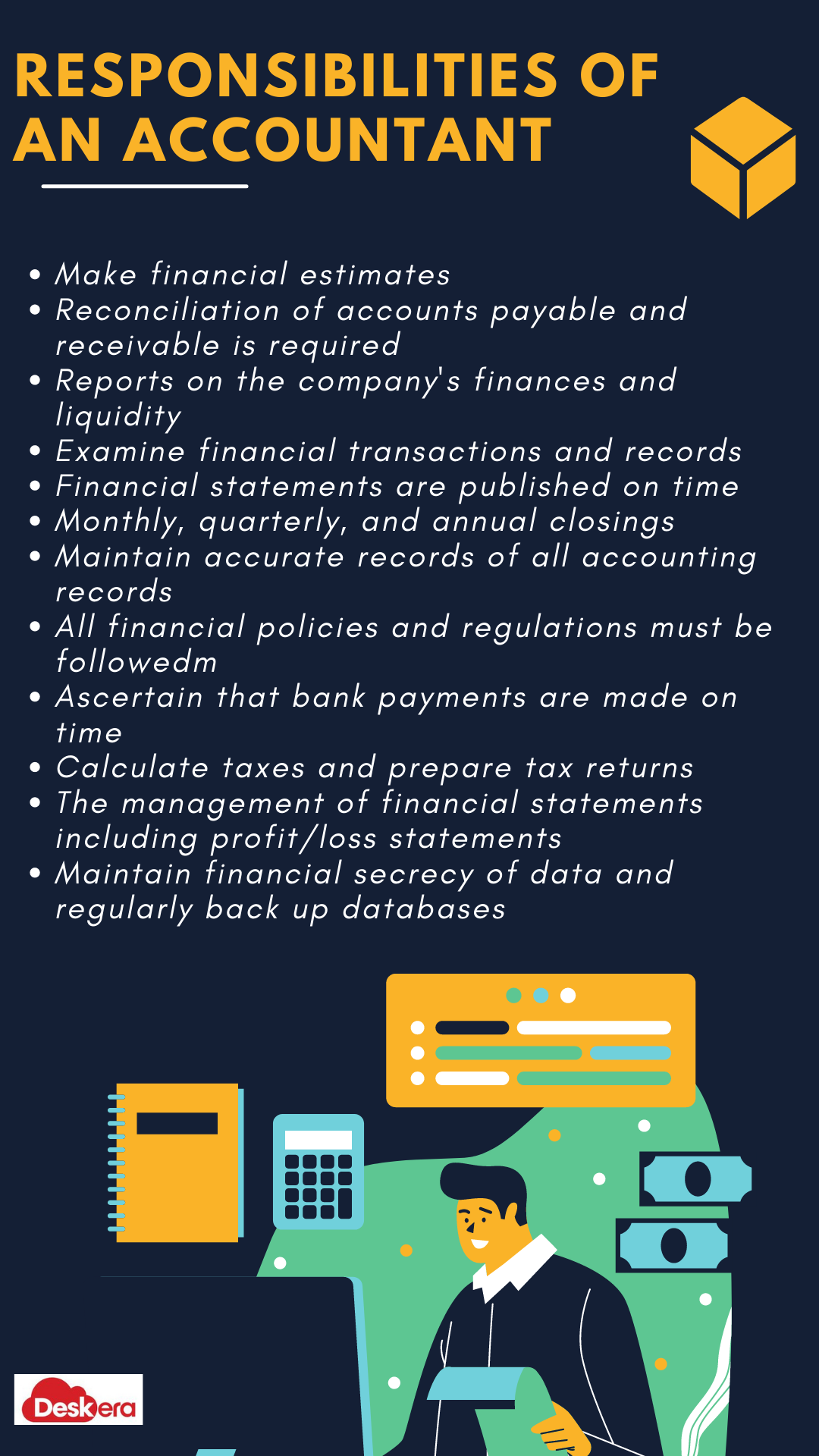According to the National Small Business Association's Technology and Business Survey, 55 percent of small business owners manage payroll online and 88 percent manage banking accounts digitally.
Accounting has a tremendous impact on a business. Further, accounting services is necessary for every small and large organization to run smoothly and efficiently. Accounting is engaged every time you document a transaction, file tax documents, or plan a cost.
No matter what, you'll need to handle accounting service sector to run a business smoothly and efficiently. However, the issue is one of quality. Your records are likely a muddle, and you're barely scraping by if you're not considering recordkeeping and accounting.

Therefore, many businesses use accountants to do accurate accounting tasks, while others rely on digital accounting software to do so.
In today’s article, we’ll learn everything about accounting services and its related concepts. Let’s take a look on what we’ll cover ahead:
- Common Accounting Services
- Why is Accounting Services Required for a Small Business?
- Bookkeeping versus Accounting
- Work of an Accountant
- Best Small Business Accounting Software
- Significance of Accounting Service for Small Business
- Right Way to Select Accounting Service Providers
- How Deskera Can Assist You?
Common Accounting Services
Accounting is without a doubt a crucial part of any business's operations. Further, accounting services include tax preparation and counseling, as well as tracking spending and earnings. Accounting is concerned with preserving accurate financial records and implementing effective recordkeeping systems.
Recordkeeping includes taxes, general ledger, bank reconciliations, billing records, and payroll records. Bookkeepers also prepare financial statements for inspection.
Even while accounting covers all of this, an accountant can offer significantly more financial advice than someone whose main responsibility is bookkeeping or recordkeeping.
Accountants assist clients with their companies by spotting issues that restrict profitability and growth, in addition to taxes and records. Services include computer system consulting, business appraisals, and retirement planning.
Understanding Accounting
Accounting is the practice of keeping track of a company's financial transactions. This usually refers to analysis and assessment rather than recording.
The accounting process includes summarizing, assessing, and reporting these transactions to regulators, authorities, and tax collection agencies.
While recordkeeping is concerned with acquiring and preserving data, most accounting is concerned with using that data to make concrete decisions or provide advice.
Following we have listed some common types of accounting:
Government Accounting
Most businesses function on a different level than the federal, state, and municipal governments. Due to the magnitude of their activities and the public nature of their finances, different accounting rules are required at times.
Any public institution required to meet these standards must submit regular financial statements and annual financial reports. These requirements necessitate specialist accounting knowledge.
Public Accounting
Public accountants are individuals or corporations that provide accounting services directly to other people and businesses.
Moreover, businesses recruit certified public accountants (CPAs) to handle financial reporting when it comes businesses or also to assist with commercial or personal tax filing.
Furthermore, public accountants assist in understanding tax rules and file tax returns, and they commonly assist businesses and individuals that are audited.
Note: The CPA qualification distinguishes licensed accounting professionals who are dedicated to public service. Moreover, these experts provide financial statement inspections and other attestation assistance to support investors understand a company's financial health.
Internal Auditing
Internal auditing is assessing a company's internal controls, corporate governance, and accounting systems for effectiveness.
However, if no one is seeking them, huge blunders and problems in major organizations and corporations may go unreported for a long period. And. this is where accountants and accounting software's such as Deskera can help.

Internal auditing is a value-added service that identifies and corrects defects in a process for management and the board of directors. This is also vital for safeguarding businesses against fraud liability.
Management Accounting
Management accounting is the most prevalent style of accounting employed by small businesses.
The technique of identifying, measuring, evaluating, interpreting, and conveying financial data to managers in order to achieve an organization's objectives is known as managerial accounting.
Furthermore, it differs from financial accounting in that the goal of managerial accounting is to aid internal customers in making accurate and well-informed company decisions and choices.
In simple words, an accountant who specializes in management or managerial accounting can help you assess your finances, analyze market conditions, and make long-term plans. Additionally, they provide you with everything you require to manage your business better.
Furthermore, these accountants help business owners produce greater short- and long-term selections by forecasting cash flow and growth.
Also, small business owners can also benefit from management accountants' help in clearer grasp their own performance variances and, as a result, identifying ways to modify and enhance.
Tax Accounting
The most popular accounting service utilized by private persons is tax accounting. Further, tax accountants are experts at preparing tax returns and assisting people and businesses with filling out forms and paying taxes.

These accountants must keep up with all of the laws and regulations since tax law is endlessly intricate and continuously changing. Moreover, they can perform more effectively and also save funds for their teammates as a result of this.
An expert accountant will be aware of every tax deductions or exemption and credit that a person is eligible to. These accountants help clients reduce their tax liabilities.
Forensic Accounting
Forensic accounting is a specialist field of accounting that can be difficult to master. Investigation and litigation support are crucial to forensic accounting.
Furthermore, a forensic accountant investigates bribery, money laundering, fraud, and embezzlement by scrutinizing financial documentation and transactions, tracking assets, and more.
Remember that forensic service is typically engaged in cases involving embezzlement, fraud or money laundering claims. Ultimately, forensic accountants comb through massive amounts of financial data in quest of relevant data.
Bank Reconciliation
Human error is one of the reasons why professional bookkeeping services are so crucial. Any human-run process is certain to make mistakes.
This is unavoidable, and a solid accounting system will catch the errors. This is when bank reconciliation is useful.
Bank reconciliation is the practice of comparing and contrasting your financial records with those of your bank, then fixing any discrepancies. You process payments before depositing them in the bank. If your records are correct, your payments should match the bank's deposit record exactly.
Accounts Payable
Accounts payable are an important component of your general ledger and a significant indicator of your company's financial health at any given time.
Furthermore, accounts payable is where you should keep a record of all of your payments and expenses. This account should be updated whenever you plan or schedule an expense. Even if you haven't paid that charge yet, it will appear here as soon as you order more stuff.
Moreover, you can assess how much money you have on hand by keeping track of your cash payments on a regular basis.
Accounts payable, on the other hand, is a category that incorporates future expenses as well, which assists your plan. If you have a business loan with an interest payment due next month, you can budget accordingly to ensure that you have the funds when you need them.
Accounts Receivable
The amount of money owing to a company for services or goods or utilized but not yet compensated for by consumers is known as accounts receivable (AR). Furthermore, accounts receivable includes all predicted or scheduled proceeds or revenue sources.
Accounts receivables are a current asset on the balance sheet. Any sum owing by clients for purchases bought on credit is referred to as AR.
You'll need to understand when you'll be paid if a customer buys anything on credit or on a lengthier payment plan. Furthermore, you can budget for future spending based on the expected inflows from such accounts receivables, even though you won't be able to acquire the monies right away.
The accounts receivable category in a general ledger is significant because it allows you to plan ahead. You'll be better prepared to change and adapt as needed if you're more aware of your company's financial status.
Entity Formation
Even before starting a business, many entrepreneurs consult with accountants to develop business plans. Accountants can be helpful in developing a strong business strategy and determining which business entity is best for the owner's goals.
Moreover, accountants can assist a small business owner in deciding on a company name, collecting information, obtaining an employment identification number, and registering their business with the state.
Payroll Processing
Another significant accounting service is payroll processing. For just a small business with very few employees, keeping track of payroll and records can take a deal of time and resources.
Accountants assist businesses in structuring and automating payroll operations to improve efficiency for both employers and employees.
Payroll accounting services include gathering employee information, putting up a time tracking system, and handling the actual processing of employee payments.
Accounting job in this field still entails authorizing and filing payroll, reporting and updating records, and engaging with employees to resolve any concerns, even though the system is mostly automated.
Bookkeeping
Maintaining accurate and thorough records is the goal of bookkeeping. This is accounting's bread and butter. Accountants have nothing to work with until bookkeeping collects data.
A Quick Look: Deskera Bookkeeping!
Small business record keeping can provide an up-to-date snapshot of a company's financial condition and health. It requires keeping track of all inputs and outputs, as well as double-checking everything for accuracy.
A bookkeeper's main tool is the general ledger, which contains all of a company's accounting information. When it comes time to file taxes or ask for a loan, a bookkeeper can simply compile financial records for a specified period of time to create a financial statement.
Why is Accounting Services Required for your Business?
Accounting is an essential component of any business either small firm or larger firm. Professional accounting services, on the other hand, can help entrepreneurs make better decisions and investments by reducing error and increasing efficiency.
In simple words, accounting services are required for small businesses in order to maintain accurate financial records, provide competent tax advice, and assure compliance with state and federal tax laws and other business rules.
Bookkeeping versus Accounting
Accounting and bookkeeping are two sides of the same coin when it comes to maintaining your financial records organized.
However, bookkeeping is primarily focused on recording daily financial transactions and operations. On the other hand, accounting analyses, strategize, and plans taxes using that financial data.
Work of an Accountant
According to the Small Business Taxation Survey conducted by the National Small Business Association (NSBA), 68% of respondents employ an outside tax practitioner or accountant to prepare their company's taxes.
An accountant is responsible for all financial matters in a corporation, such as maintaining and analyzing financial records. Furthermore, to keep their organization in good financial shape, they may be in charge of tasks like reconciling bank records and computing payroll.
Additionally, accountants have a wide range of responsibilities. It ranges from examining financial papers and conducting financial inspections to reconciling financial records and computing taxes on annual returns.
Some of the responsibilities of an Accountant are mentioned below:
- Make financial estimates
- Reconciliation of accounts payable and receivable is required
- Reports on the company's finances and liquidity
- Examine financial transactions and records
- Financial statements are published on time
- Monthly, quarterly, and annual closings
- Maintain accurate records of all accounting records
- .All financial policies and regulations must be followed
- Ascertain that bank payments are made on time
- Calculate taxes and prepare tax returns
- The management of financial statements including profit/loss statements
- Maintain financial secrecy of data and regularly back up databases

Furthermore, accountants deal with small business owners or huge corporation executives to ensure the accuracy of their financial documents. Throughout the year, accountants may work with specific management team to collect and audit financial documents.
A qualified Certified Public Accountant (CPA) will save you time by clearly expressing the financial health of your firm to you and anticipating your financial needs.
Accounting specialists like Certified Public Accountant (CPAs) and tax advisers can also supply you with expertise and insight that non-accountants just don't have.
These professionals may advise you on tax deductions you didn't realize you were eligible for, tax rules you didn't realize you were breaching, and best practices learned while working for other businesses in your field.
If those are suggestions that your company might use right now, it may be time to engage an accountant.
Best Small Business Accounting Software
As more people pursue entrepreneurship, small business digital accounting software has advanced significantly.
Your self-service software is now nearly as good as accounting software used in businesses all over the world. Your solution for the best small business accounting software is—Deskera
Deskera Accounting software assists in automating all accounting tasks, including invoicing, billing, expenses, payments, taxes, reporting, approval flows, and more. Stay compliant with the latest GST rules, e-Invoices, and cess rates. You can simply sign up for free trial on Deskera and sort out all your accounting concerns in the most simplest manner.
Significance of Accounting Service for Small Business
The importance of accounting services for small enterprises has been highlighted more below. Let's get started:
1) Accounting Aids in Expansion Planning
Every great adventure starts with a map. Setting goals is critical when planning your company's expansion.
Furthermore, you can maintain track of your company's money by keeping a record of your accounting. This data is crucial for determining how quickly your company grows and makes future decisions. You won't have a complete financial picture until you have reliable reporting.
2) Accounting is Required to Obtain a Loan
If you want to obtain loan funds for your small or larger business, then you must have to showcase recent financial statements.
Assume you wish to apply for a loan from the Small Business Administration through one of the banks (SBA). Then there are three years' worth of financial statements and a one-year cash flow estimate that you must provide. Without an accounting system in place, delivering any of these is nearly difficult.
3) Accountancy is Aimed at Attracting Investors or Sell your Business
It's a good idea to have your options open even if you don't plan to find investors or sell your firm right now. And for now, the easiest method to do it is to build up a proper accounting system.
Potential investors, stakeholders, or buyers will want accounting records audited process by a CPA (Certified Public Accountant) that demonstrate your business is growing and on track for expansion.
4) Accounting Assists in Receiving Payment
When a client owes you money, Accounts Receivable (AR) displays on your balance sheet. Your accounting software or you or your accountant can produce AR automatically or manually.
The balance sheet displays how much of your AR has already been collected and how much is still due for the month.
By examining at your balance sheet, you can see how well you're collecting funds. Then you may put measures in place, such as stricter payment deadlines or more client follow-up, to assure that you get your hands on your money when you need it.
5) Accounting Assists you in Keeping Track of your Loans or Debts
If your company has debts from a variety of sources, such as credit cards, loans, and accounts payable, you'll have to check numerous accounts to see what you owe.
Furthermore, the balance sheet consolidates all of your debts into one convenient location. It also shows you the balances of all of your bank accounts so you can examine them all at once. Eventually, it's the perfect report to check to see if you have enough funds to cover your obligations and make future payments.
6) Accounting Reduces the Chances of Breaking the Law
It might be challenging to maintain track of all your tax information reporting duties as your company expands.
Furthermore, if your financial reports contain errors, you risk underreporting your earnings. Either error might get you in trouble with the IRS and other government agencies.
Eventually, solid accounting ensures that you keep complete and accurate financial records, lowering your chances of breaching tax regulations and facing an audit. Moreover, when you hire an accountant to handle your taxes, you can rest assured that they will be completed correctly and on schedule.
7) Accounting can help you pay the right amount of tax.
The IRS will punish you if you do not pay the right amount of taxes as per required by the law. Furthermore, it's important to remember that a tax refund is not free cash from the IRS. It's money you could have invested in your firm instead of overpaying the government.
Miscalculated quarterly anticipated tax payments frequently result in refunds. You must forecast your revenue to accurately calculate quarterly projected tax payments. It's nearly impossible to do so without accurate accounting and solid financial records.
Right Way to Select Accounting Service Providers
After you've determined exactly what sort accounting services you require, the next step is to determine who will supply them.
While a bookkeeper is responsible for data entry, a Certified Public Accountant (CPA) can represent you before the IRS as well as provide financial advice. Financial providers might include contractors, workers, and full-service corporations.
Before making a decision, think about the following:
- Do accounting responsibilities in your company necessitate industry knowledge?
- Should you integrate your outsourced accounting services with your existing accounting software?
- Would you like to collaborate with your accountant (local) or work from home?
- Do you want to select the same business to take care of both payroll and HR?
- Are you looking for year-round help or tax management services as the year draws to a close?
- Do you need a team of professionals or can a contractor finish the job?
- Do you prefer to use a mobile app or an online portal to administer your accounting services?
How Deskera Can Assist You?
Deskera Books is an online accounting, invoicing, and inventory management software that is designed to make your life easy. A one-stop solution, it caters to all your business needs, from creating invoices and tracking expenses to viewing all your financial documents whenever you need them.
Final Takeaways
We have now reached at the end of this detailed guide. As a result, we've compiled a summary of key topics from this guide for your future reference:
- Accounting has an tremendous impact on a business. It is necessary for every small and large organisation to run smoothly and efficiently.
- Accounting services include tax preparation and counseling, as well as tracking spending and earnings. Accounting is concerned with preserving accurate financial records and implementing effective recordkeeping systems.
- Accountants assist clients with their companies by spotting issues that restrict profitability and growth, in addition to taxes and records. Services include computer system consulting, business appraisals, and retirement planning.
- The accounting process includes summarising, assessing, and reporting these transactions to regulators, authorities, and tax collection agencies.
- Public accountants are individuals or corporations that provide accounting services directly to other people and businesses.
- Moreover, businesses recruit certified public accountants (CPAs) to handle financial reporting when it comes businesses or also to assist with commercial or personal tax filing.
- The CPA qualification distinguishes licenced accounting professionals who are dedicated to public service. These experts provide financial statement inspections and other attestation assistance to support investors understand a company's financial health.
- Internal auditing is a value-added service that identifies and corrects defects in a process for management and the board of directors. This is also vital for safeguarding businesses against fraud liability.
- The technique of identifying, measuring, evaluating, interpreting, and conveying financial data to managers in order to achieve an organization's objectives is known as managerial accounting.
- Small business owners can also benefit from management accountants' help in clearer grasp their own performance variances and, as a result, identifying ways to modify and enhance.
- Tax accountants are experts at preparing tax returns and assisting people and businesses with filling out forms and paying taxes.
- Forensic accounting is a specialist field of accounting that can be difficult to master. Investigation and litigation support are crucial to forensic accounting.
- Bank reconciliation is the practice of comparing and contrasting your financial records with those of your bank, then fixing any discrepancies. You process payments before depositing them in the bank. If your records are correct, your payments should match the bank's deposit record exactly.
- Accounts payable is where you should keep a record of all of your payments and expenses. This account should be updated whenever you plan or schedule an expense.
- The amount of money owing to a company for services or goods or utilised but not yet compensated for by consumers is known as accounts receivable (AR). Furthermore, accounts receivable includes all predicted or scheduled proceeds or revenue sources.
- Accountants can assist a small business owner in deciding on a company name, collecting information, obtaining an employment identification number, and registering their business with the state.
- For just a small business with very few employees, keeping track of payroll and records can take a deal of time and resources. Accountants assist businesses in structuring and automating payroll operations to improve efficiency for both employers and employees.
- Small business record keeping can provide an up-to-date snapshot of a company's financial condition and health. It requires keeping track of all inputs and outputs, as well as double-checking everything for accuracy.
- Bookkeeping is primarily focused on recording daily financial transactions and operations. On the other hand, accounting analyses, strategize, and plans taxes using that financial data.
- A qualified Certified Public Accountant (CPA) will save you time by clearly expressing the financial health of your firm to you and anticipating your financial needs.
- It's a good idea to have your options open even if you don't plan to find investors or sell your firm right now. And for now, the easiest method to do it is to build up a proper accounting system.
- if your financial reports contain errors, you risk underreporting your earnings. Either error might get you in trouble with the IRS and other government agencies.
- You must forecast your revenue to accurately calculate quarterly projected tax payments. It's nearly impossible to do so without accurate accounting and solid financial records.
Related Articles













